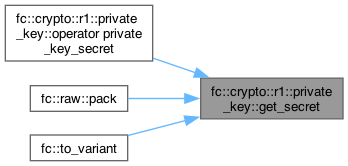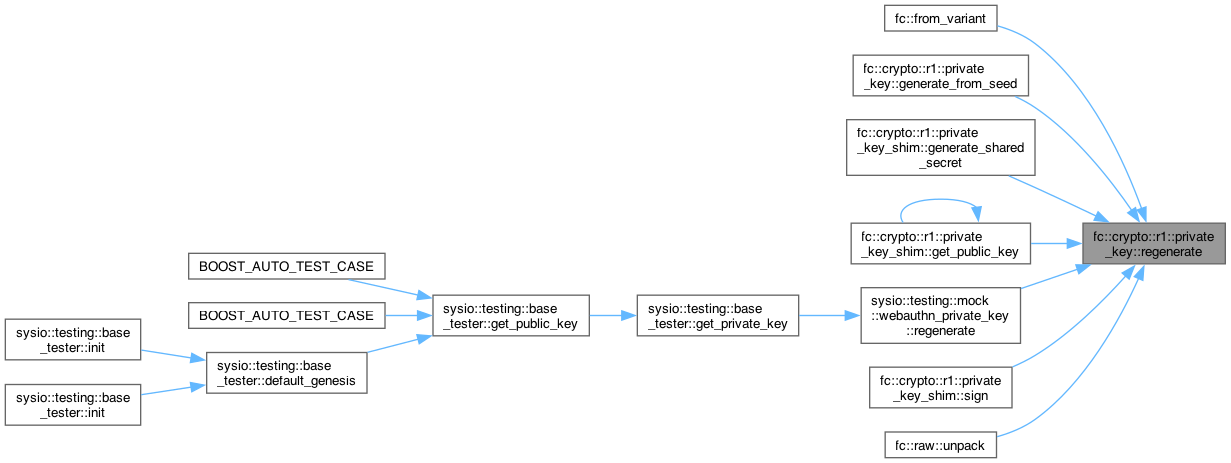an elliptic curve private key. More...
#include <elliptic_r1.hpp>
Public Member Functions | |
| private_key () | |
| private_key (private_key &&pk) | |
| private_key (const private_key &pk) | |
| ~private_key () | |
| private_key & | operator= (private_key &&pk) |
| private_key & | operator= (const private_key &pk) |
| private_key_secret | get_secret () const |
| operator private_key_secret () const | |
| fc::sha512 | get_shared_secret (const public_key &pub) const |
| signature | sign (const fc::sha256 &digest) const |
| compact_signature | sign_compact (const fc::sha256 &digest) const |
| bool | verify (const fc::sha256 &digest, const signature &sig) |
| public_key | get_public_key () const |
Static Public Member Functions | |
| static private_key | generate () |
| static private_key | regenerate (const fc::sha256 &secret) |
| static private_key | generate_from_seed (const fc::sha256 &seed, const fc::sha256 &offset=fc::sha256()) |
Friends | |
| bool | operator== (const private_key &a, const private_key &b) |
| bool | operator!= (const private_key &a, const private_key &b) |
| bool | operator< (const private_key &a, const private_key &b) |
Detailed Description
Definition at line 79 of file elliptic_r1.hpp.
Constructor & Destructor Documentation
◆ private_key() [1/3]
| fc::crypto::r1::private_key::private_key | ( | ) |
Definition at line 331 of file elliptic_r1.cpp.
◆ private_key() [2/3]
| fc::crypto::r1::private_key::private_key | ( | private_key && | pk | ) |
Definition at line 585 of file elliptic_r1.cpp.
◆ private_key() [3/3]
| fc::crypto::r1::private_key::private_key | ( | const private_key & | pk | ) |
Definition at line 581 of file elliptic_r1.cpp.
◆ ~private_key()
| fc::crypto::r1::private_key::~private_key | ( | ) |
Definition at line 512 of file elliptic_r1.cpp.
Member Function Documentation
◆ generate()
|
static |
Definition at line 391 of file elliptic_r1.cpp.

◆ generate_from_seed()
|
static |
This method of generation enables creating a new private key in a deterministic manner relative to an initial seed. A public_key created from the seed can be multiplied by the offset to calculate the new public key without having to know the private key.
Definition at line 334 of file elliptic_r1.cpp.

◆ get_public_key()
| public_key fc::crypto::r1::private_key::get_public_key | ( | ) | const |
◆ get_secret()
| fc::sha256 fc::crypto::r1::private_key::get_secret | ( | ) | const |
Definition at line 373 of file elliptic_r1.cpp.

◆ get_shared_secret()
| fc::sha512 fc::crypto::r1::private_key::get_shared_secret | ( | const public_key & | pub | ) | const |
Given a public key, calculatse a 512 bit shared secret between that key and this private key.
Definition at line 503 of file elliptic_r1.cpp.

◆ operator private_key_secret()
|
inline |
Definition at line 102 of file elliptic_r1.hpp.

◆ operator=() [1/2]
| private_key & fc::crypto::r1::private_key::operator= | ( | const private_key & | pk | ) |
Definition at line 609 of file elliptic_r1.cpp.
◆ operator=() [2/2]
| private_key & fc::crypto::r1::private_key::operator= | ( | private_key && | pk | ) |
Definition at line 563 of file elliptic_r1.cpp.
◆ regenerate()
|
static |
Definition at line 357 of file elliptic_r1.cpp.

◆ sign()
| signature fc::crypto::r1::private_key::sign | ( | const fc::sha256 & | digest | ) | const |
Definition at line 416 of file elliptic_r1.cpp.

◆ sign_compact()
| compact_signature fc::crypto::r1::private_key::sign_compact | ( | const fc::sha256 & | digest | ) | const |
Definition at line 178 of file elliptic_openssl.cpp.


◆ verify()
| bool fc::crypto::r1::private_key::verify | ( | const fc::sha256 & | digest, |
| const signature & | sig ) |
Definition at line 489 of file elliptic_r1.cpp.

Friends And Related Symbol Documentation
◆ operator!=
|
friend |
Definition at line 120 of file elliptic_r1.hpp.
◆ operator<
|
friend |
Definition at line 124 of file elliptic_r1.hpp.
◆ operator==
|
friend |
Definition at line 116 of file elliptic_r1.hpp.
The documentation for this class was generated from the following files:
- libraries/fc/include/fc/crypto/elliptic_r1.hpp
- libraries/fc/src/crypto/elliptic_openssl.cpp
- libraries/fc/src/crypto/elliptic_r1.cpp
